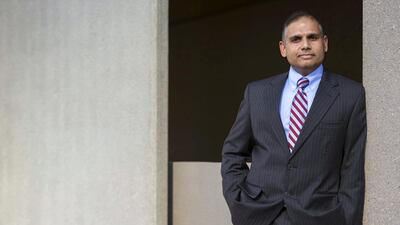Omar Abedin says the lowest point in his business life arrived in December 2013. Mentally and physically exhausted, he was also overweight, smoking a lot and not sleeping.
“I have now got enough distance from it to be able to look at it positively and draw learning from it,” says Mr Abedin, 45, speaking of a $360,000 debt he acquired virtually overnight from two struggling business ventures.
It all started when one of the companies, the Dubai-based Training Hotline, which provided training for companies, was planning a big programme in Dubai and Pakistan in November 2013. Up until the last minute, Mr Abedin’s business partner had made commitments about the number of people who were going to attend the programme in Pakistan.
“Long story short I was left holding the ball for the tune of about $150,000,” says Mr Abedin, who is originally from Pakistan.
At the same time, the serial entrepreneur’s Toronto-based brand consulting business, Brand Hotline, also hit the rocks.
“One client dissed me to the tune of about $160,000 for work I had done for them for a period of almost one year,” he adds. “I helped them to buy a company. I ran that process for them on the understanding that I would be paid 1 per cent of the value of the company as a success fee and at the end of it they said you know what, we are not going to pay you.”
When a second client almost went under and was not able to pay as promised, he ended up with a total debt of $200,000 with Brand Hotline, and another $160,000 from Training Hotline.
The stress took a toll on his health and he realised that if he did not turn his fortunes around he would fall apart. However, the first step towards achieving this came from an unlikely source.
“My sister-in-law, God bless her soul, gave me a Fitbit, one of those little electronic things that track how much you walk and how many calories you burn and all of that stuff,” he recalls. “When I started I could barely do 2,000 steps a day. I was that unfit.”
But soon he started losing weight and writing, something that had always been a passion, publishing his book Brand New You on Amazon in August. He also took up yoga, which he credits with giving him spiritual calmness and the ability to disconnect from everything going on around him. Through all of this he says he found the strength to keep going and address his problems.
“Throughout life we experience many transitions and wake-up calls, some of our choice and others not,” says Jules Lewis, the founder of Mountain High, a motivational consultancy. “During the healing period we turn to different modalities to ease our path – yoga, meditation, walking in nature, reading inspirational books, listening to music etc. This allows us to be and connect with our inner wisdom. Our strength, spirit and resilience kick back in. We dust ourselves down, get back up and start walking towards our dream – stronger and wiser.”
Mr Abedin used his new-found spiritual strength to address his problems head-on, packing his Dubai-based wife and children off to live with his brother-in-law in the United States for a year while he flew across the globe to work on projects to raise money to help pay off his debts.
This included selling his home in Canada and securing a new job last May as a marketing specialist in Abu Dhabi for some more stability. His family moved to the UAE the following month, allowing them to put the past behind them. He is now down to paying off the last $15,000 of the debt.
As traumatic as the experience was, it has not put him off launching another venture – Training Hotline is defunct, while Brand Hotline is still operating albeit “under the radar”.
Mr Abedin now plans to launch the I Am Muslim app, to help the faithful track their religious activities.
He is currently raising money to fund the project through the Kickstarter funding platform, with a goal of raising C$250,000 (Dh703,1m). However, the campaign has raised just C$1,267 with only 12 days to go.
"The objective is to try to raise money to not only build an app, because building an app is not that hard or expensive, but actually maintaining an app, and making sure that its content is valid. I am asking people to pitch in and so far I am failing miserably," he says.
“This is an app idea I have had for a year and I have been refusing to do anything with it until I thought you know what? I have got to give it a shot.”
So what happens if his campaign doesn’t secure the cash?
“It will be back to the drawing board. Kickstarter only pays out if you raise the full amount, so I may have to look for other sources of investment,” he says.
It appears this serial entrepreneur does not let failure stop him from trying, trying and trying again.
business@thenational.ae
Follow The National's Business section on Twitter

